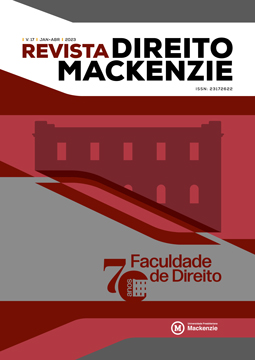THE ENVIRONMENTAL RULE OF LAW AND THE OBSTACLES TO THE FUNCTIONAL DIFFERENTIATION OF SOCIETY IN PERIPHERAL COUNTRIES
Abstract
This article aims to analyze how, in contemporary society, ecological problems are faced by the rule of law. At first, it delineates the environment in the context of a global and functionally differentiated society. The Rule of Law and the consequences of a global society will then be studied, with a systemic observation of the main characteristics and problems of the Environmental Rule of Law in peripheral countries. The mistaken idea that there are no ecological problems presents doubt on the normative expectation that it is illegal to cause environmental damage, with implications for other functional systems, resulting in a systemic effect. And, as society is functionally differentiated, a functional system is not competent to fulfill the function of another, characterizing, on the contrary, an interdependence, where each functional system is autonomous in relation to the fulfillment of its own function, but, simultaneously, depends on the performance of the other functional systems at an adequate level.
References
AMADO, Juan Antonio García. A Sociedade e o Direito na obra de Niklas Luhmann. In: ARNAUD, André-Jean; LOPES JÚNIOR, Dalmir (org.). Niklas Luhmann: do sistema social à sociologia jurídica. Rio de Janeiro: Editora Lumen Juris, 2004.
BORA, Alfons. Capacidade de lidar com o futuro e responsabilidade por inovações – para o trato social com a temporalidade complexa. In: SCHWARTZ, Germano (org.). Juridicização das Esferas Sociais e Fragmentação do Direito na Sociedade Contemporânea. Porto Alegre: 2012, p. 127-145.
CAMPILONGO, Celso. Política, sistema jurídico e decisão judicial. São Paulo: Max Limonad, 2002.
CARVALHO, Délton Winter de. Dano Ambiental Futuro: A responsabilização civil pelo risco ambiental. 2ª ed. Porto Alegre: Livraria do Advogado, 2013.
__________________________. Gestão Jurídica Ambiental. São Paulo: Thompton Reuters/Revista dos Tribunais, 2017.
CORSI, Giancarlo; ESPOSITO, Elena; BARALDI, Cláudio. Glosario sobre la teoría Social de Niklas Luhmann. México: Universidad Iberoamericana, 2006.
DE MORAIS, José Luiz Bolzan. As Crises do Estado e da Constituição e a Transformação Espacial dos Direitos Humanos. Porto Alegre: Livraria do Advogado, 2002.
FARBER, Daniel. From here to eternity: environmental law and future generations. In: University of Illinois Law review, 2003, p. 289-336.
GUIBENTIF, Pierre. Os direitos subjectivos na teoria dos sistemas de Niklas Luhmann. In: SCHWARTZ, Germano (Org.). Juridicização das Esferas Sociais e Fragmentação do Direito na Sociedade Contemporânea. Porto Alegre: Livraria do Advogado, 2012, p. 171-198.
LEITE, José Rubens Morato; CAVEDON, Fernanda Salles. A Justiça Ambiental como paradigma para o direito das catástrofes: por uma abordagem ética e ambiental da gestão dos riscos de catástrofes ecológicas. n: FARBER, Daniel; CARVALHO, Délton Winter de (orgs.). Estudos aprofundados em direito dos desastres: interfaces comparadas. Curitiba: Editora Prismas, 2017, p. 407-446.
LUHMANN, Niklas. Differentiation of Society. In: Canadian Journal of Sociology. Vol. 2, n.º 1, 1977.
________________. La moral social y su reflexión ética. In: PALACIONS, Francisco; JARAUTA, Xavier. Razón, ética e política: el conflicto de las sociedades modernas. Barcelona: Anthropus, 1989, p. 47-58.
_________________. El derecho de la sociedad. México: Herder, 2005.
_________________. Introdução à Teoria dos Sistemas. 2ª ed. Petrópolis: Vozes, 2010a.
_________________. La cultura como un concepto histórico. In: Historia y grafia. N.º 8, 1997, p. 11-33.
_________________. La Sociedad de la Sociedad. México: Herder, 2007.
_________________.Organización y decisión. México: Universidad Iberoamericana, 2010b.
_________________. Los Derechos Fundamentales como Institución: aportación a la sociología política. México: Universidad Iberoamericana, 2010c.
_________________. Observaciones de la modernidad: racionalidad y contingencia en la sociedade moderna. Barcelona: Paidós, 1997.
_________________. Poder. México: Universidad Iberoamericana, 2005c.
_________________. Sistemas Sociales: lineamientos para una teoría general. 1ª ed. México: Alianza Editoral/Universidad Iberoamericana, 1991.
_________________. Sociologia do Direito I. Rio de Janeiro: Tempo Brasileiro, 1983b.
_________________. Sociologia do Direito II. Rio de Janeiro: Tempo Brasileiro, 1985.
_________________. The World Society as a Social System. In: International Journal of General Systems. Vol. 8, 1982.
MASCAREÑO, Aldo. Diferenciación, Inclusión/Exclusión y Cohesión en la Sociedad Moderna. Revista CIS, Chile, 2º semestre, 2014.
MATTHEIS, Clemens. The System Theory of Niklas Luhmann and the Constitucionalization of the World Society. In: Goettingen Journal of International Law. Vol. 4, n.º 2, 2012.
NAFARRATE, Javier Torres. Niklas Luhmann: la política como sistema. Lecciones publicadas por Javier Torres Nafarrate. Universidade Iberoamericana, 2009.
MEDEIROS, Fernanda Luiza Fontoura de. Meio Ambiente: direito e deber fundamental. Porto Alegre: Livraria do Advogado, 2004.
NEVES, Marcelo. A Constituição Simbólica. 2ª ed. São Paulo: 2007.
______________. A Força Simbólica dos Direitos Humanos. In: Revista Eletrônica de Direito do Estado. N.º 4, 2005.
_________________. Los Estados en el centro y los Estados en la periferia: algunos problemas con la concepción de Estados de la sociedad mundial en Niklas Luhmann. In: NAFARRATE, Javier Torres; MANSILLA, Darío Rodríguez (ed.). Niklas Luhmann: La Sociedad como Pasión: aportes a la teoría de la sociedad de Niklas Luhmann. México: Universidad Iberoamericana, 2011.
______________. Entre Hidra e Hércules: princípios e regras constitucionais. São Paulo: WMF Martins Fontes, 2013a.
_________________. Transconstitucionalismo. São Paulo: Editora WMF Martins Fontes, 2013b.
PHILIPPOPOULOS-MIHALOPOULOS, Andreas. Towards a Critical Envrionmental Law. In: University of Westminster School of Law, Research N. 12-08, 2008.
RIBEIRO, Diógenes Vicente Hassan. A revisão do princípio da separação dos poderes:por uma teoria da comunicação. Rio de Janeiro: 2016.
ROCHA, Leonel Severo. Direito, Complexidade e Risco. In: Sequência. Florianópolis, n. 28, 1994.
ROCHA, Leonel Severo; SCHWARTZ, Germano; CLAM, Jean. Introdução à Teoria do Sistema Autopoíetico do Direito. 1ª ed. Porto Alegre: Livraria do Advogado, 2005.
ROCHA, Leonel Severo; KING, Michael; SCHWARTZ, Germano. A Verdade sobre a autopoiese no direito. Porto Alegre: Livraria do Advogado, 2009.
RODRÍGUEZ, Darío Mansilla. Los Límites del Estado en la Sociedad Mundial: de la Política al Derecho. In: NEVES, Marcelo (coord.). Transnacionalidade do Direito: novas perspectivas dos conflitos entre ordens jurídicas. São Paulo: Quartier Latin, 2010.
RODRÍGUEZ, Darío Mansilla; ARNOLD, Marcelo. Sociedad y teoría de sistemas: Elementos para la compresión de la teoría de Niklas Luhmann. Santiago de Chile: Editorial Universitaria, 2007.
RODRÍGUEZ, Darío Rodríguez; NAFARRATE, Javier Torres. Introducción a la teoría de la sociedad de Niklas Luhmann. México: Herder, 2008.
RODRÍGUEZ, Darío Rodríguez; OPAZO, Maria Pilar. Comunicaciones de la Organización. Santiago: Ediciones Universidad Católica de Chile, 2007.
ROUSSEAU, Jean Jacques. Do contrato social. São Paulo: Nova Cultural, 1987.
SALET, Ingo Wolfgang. A Eficácia dos Direitos Fundamentais. 5ª ed. Porto Alegre: Livraria do Advogado, 2005
SCHWARTZ, Germano. O humano e os humanos nos direitos humanos. Animais, Pacha Mama e altas tecnologias. In: SCHWARTZ, Germano (org.). Juridicização das Esferas Sociais e Fragmentação do Direito na Sociedade Contemporânea. Porto Alegre: Livraria do Advogado, 2012.
___________________. As Teses Radicais de Luhmann. In: Revista de Estudos Constitucionais, Hermenêutica e Teoria do Direito. Vol. 6, n.º 1, 2014.
__________________. As Constituições estão mortas? Momentos constituintes e comunicações constitucionalizantes dos novos movimentos sociais do Século XXI. Rio de Janeiro: Lumen Juris, 2018.
SOUZA NETO, Cláudio Pereira de; SARMENTO, Daniel. Direito Constitucional: teoria, histórica e métodos de trabalho. Belo Horizonte: Fórum, 2012.
STICHWEH, Rudolf. Sport as a function system in world society. IN: European Journal for Sport and Society, 10 (2), 2013.
STRECK, Lenio Luiz; DE MORAIS, José Luis Bolzan. Ciência Política e Teoria Geral do Estado. Porto Alegre: Livraria do Advogado, 2000.
TEUBNER, Gunther. Transnational Fundamental Rights: horizontal effect? In: Eleven International publishing (40/3), 2011.
WEISS, Edith Brown. Climate Change, Intergenerational Equity, and International Law. In: Georgetown University Law Center, 2008. Disponível em: < http://scholarship.law.georgetown.edu/facpub/1625>. Acesso em: 11/03/2018.
Downloads
Published
Issue
Section
License
Copyright (c) 2023 Diógenes Vicente Hassan Ribeiro, Douglas Cunha Hassan Ribeiro

This work is licensed under a Creative Commons Attribution 4.0 International License.
The copyright of the articles published in Mackenzie Law Review belongs to the authors, who grant Mackenzie Presbyterian University the rights of publication of the contents, and the assignment takes effect upon submission of the article, or work in similar form, to the electronic system of institutional publications. The journal reserves the right to make normative, orthographic, and grammatical alterations to the originals, with the aim of maintaining the cultured standard of the language, respecting, however, the style of the authors. The content reported and the opinions expressed by the authors of the articles are their exclusive responsibility.











